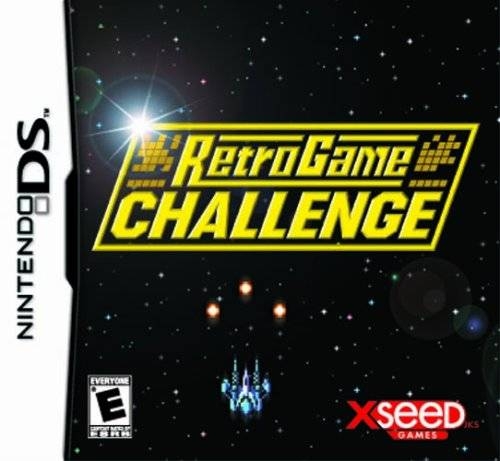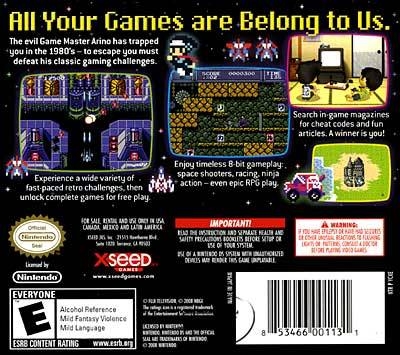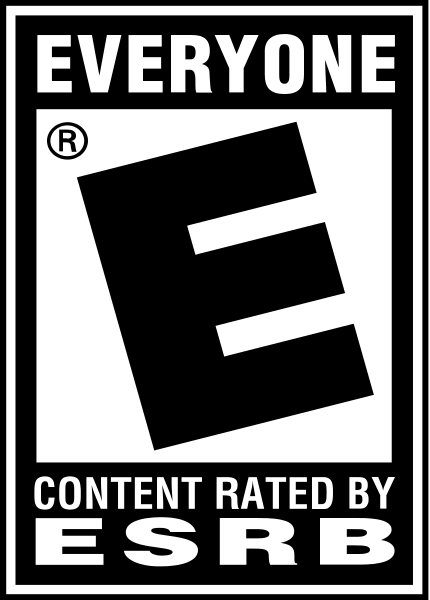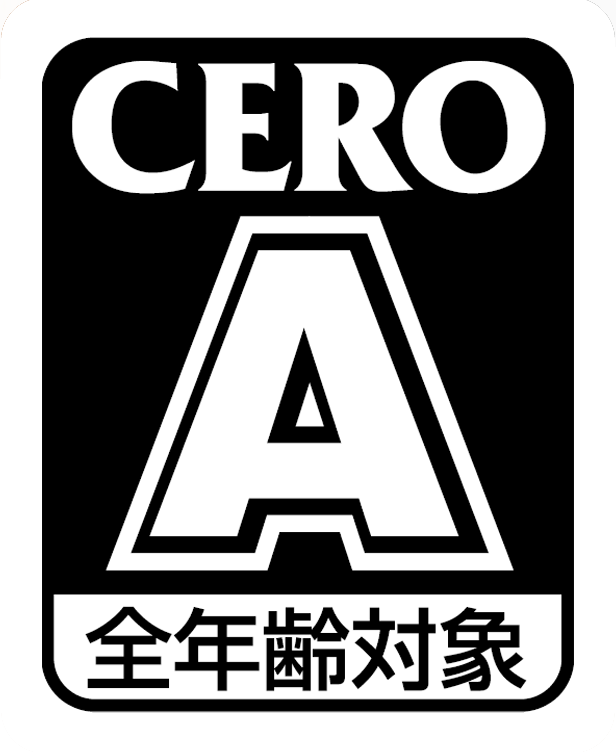Existing User Log In
New User Registration
Register for a free account to gain full access to the VGChartz Network and join our thriving community.





America - Front


America - Back



Game Center CX: Arino no Chousenjou
ゲームセンターCX 有野の挑戦状
Bandai Namco Games
Action
 02/10/09 Xseed Games
02/10/09 Xseed Games  11/16/07 Bandai
11/16/07 Bandai  (Add Date)
(Add Date)
| Owners: | 27 | |
| Favorite: | 0 | |
| Tracked: | 0 | |
| Wishlist: | 0 | |
| Now Playing: | 1 | |
GameCenter CX is a Japanese video game show featuring comedian Shinya Arino, employed at the GameCenter CX Company, whose sole job is to sit around and play retro video games. He actually gets promoted - and demoted - based on his performance. Namco-Bandai turned this idea into a video game, released only in Japan a year and a half ago. XSEED Games worked up the courage to actually bring the game overseas, and so now we have Retro Game Challenge, a strange yet extremely well put-together package all about playing retro-style video games.
The premise is simple, if a bit odd. Arino, frustrated at his lack of skills in modern competitive multiplayer games, has had his obsession create a digitalzied version of himself haunting his Nintendo DS. This spook (Game Master Arino) is now invading other players' DS's, turning them into children and sending them back to the 80s to complete challenges in retro games with his younger self, all while taunting you as a giant floating head. The introductory story is also presented in Star Wars flowing-text style. Sound wacky enough for you?
The presentation is top-notch in terms of design. You're presented with eight original NES-style games across several genres, but Retro Game Challenge goes well above the typical game compilation. Firstly, Game Master Arion gives you bite-size challenges to complete for each game that introduce you to various gameplay tactics to get you into each game and help you complete them. While not actively playing the retro games, you can browse through the fully-illustrated game manuals and 16 different game magazines for hints, tricks, previews and reviews, Q&As with the fictional developers and even working cheat codes. You can also chat with young Arino at any time, with a lot of different short dialogues scripted - after 25 attempts I never saw one repeated. While playing the retro games you'll also hear young Arino speak several short exclamations which line up pretty well with the action on the screen. There's disappointment when you die, boredom when you're not doing anything and excitement on reaching/beating a boss, etc. The design put forth here really goes a long way towards immersing the player in the feel of the 80s video game culture and playing these old-style games alongside a buddy. While Namco-Bandai deserves most of the credit putting this impressive package together, XSEED Games has also given us a fantastic localization, not just translating text but also replacing obscure Japanese reference with obscure American ones to maintain the same feel of the game over here.
On to the games themselves. Admittedly, there are a couple duds; two of the games are highly derivative sequels with almost nothing changed from the original. Considering the fictional release dates for these games, their presence could be interpreted as a parody of the rampant production of quick sequels at the time (like six Mega Man games for the NES over the course of seven years). One of these games isn't even truly a sequel but a special-edition adver-game, which serves as another social commentary on the gaming culture at the time but ultimately feels like a wasted spot in the line up. However for the most part these are high-quality, original 8-bit titles that recreate most of the feel of the retro games without most of the annoyances - bugs and glitches, poor translations, high difficulty curves and so on.
You start off with Cosmic Gate, a very basic space shooter along the lines of Galaga, with a score system and 64 different levels. Your spacecraft can only move left and right while waves of enemy ships enter the screen and line up, then take turns dive-bombing you. Every few levels you'll get a bonus stage where you can blow up asteroids for extra points. There's a powerup which gives you a penetrating laser shot but otherwise this initial game is actually very simple, if still a quality title - an appetizer to the rest of the experience so to speak. The challenges here are clearing up to the fifth stage; taking two consecutive warps (you have to read the in-game magazines to figure out how to activate said warps, a common tactic throughout the game); destroying a large asteroid; and achieving a high score of 200,000. Successfully completing each of the challenges will unlock the next retro game.
Haggle Man is a side-scrolling platformer of sorts, with many elements from classic NES platformers. You control Haggle Man through several 'floors' - small areas that can scroll left and right, and most will circle you back to the other side. In order to progress you have to defeat the boss of each floor. Also on each floor are several enemies and a dozen or so doors, each with a different letter and one of three colors. Opening one door will simultaneously open all like-colored doors on the screen, damaging any enemies nearby. You can also hide inside the doors to let enemies pass by harmlessly. Rather than using the doors you will most commonly defeat enemies by simply jumping on their heads, and you can also throw ninja stars to stun them and collect scrolls to summon an ally to help out for a moment. Your goal is to rescue the princess, of course. The game is very reminiscent of early NES-era platforms, though the variety is pretty limited with only four enemy types plus a special boss. Successive floors will eventually repeat the same enemies, but in a different color and at a higher speed.
Third up is a simple yet fun top-down rally racer, Rally King. There are four courses and you have to complete two laps to finish each one. You start off in 20th place out of 20 competitor and have to pass each one ahead of you during the race to keep as few cars on the screen at once as possible. You'll have to use braking and drifting to get around some of the tighter corners and you'll take damage and spin out every time you contact a wall or another car. Take too much damage and you blow up, ending the race. There are slippery spots that will cause a spinout if you don't correct your steering, rough patches that hurt your speed and ramps that give you a small speed boost. The four courses each contain the same basic gameplay, but with different color schemes and scenery. You'll need at least eighth place in any given race to move onto the next, and your final rank is determined behind the scenes based on your performance on all four courses. The controls can take some time to get used to but they work pretty well. Getting first place in every race can be a challenge sometimes but passing any individual course is actually pretty easy.
Without going into too much detail to spoil the storyline and other surprises and references, the remaining games consist of an evolved space shooter with vertical movement and scrolling, terrain to fire upon and multiple power-ups; the two derivative sequels; an epic RPG which is a sped-up full-length original Dragon Quest knockoff; and a revolutionary sequel which completely changes the gameplay to a Ninja Gaiden-like sidescrolling action game. The last two titles in particular highlight the great in-depth gameplay possible in the latter part of the NES era and are the only ones to feature save files. The RPG alone will probably take up half of your playtime and has been upgraded with an ability to let the AI fight for you during routine random battles. There are warp spells available early on, capturable monsters, and no "Game Overs" - you simply restart at the base castle with half your money if everyone in your three-member party is knocked out.
For each of these games you'll see the action play out solely on the top screen, while on the bottom screen you mainly see your character and young Arino sitting on the floor watching the TV. During the retro gameplay you'll use your DS as a pseudo-NES controller with just the D-pad and the A and B buttons, though in one game you can use the Y button as a fake turbo button. Holding R and pressing X acts as your simulated console's reset button, while holding L while pressing X will send the focus back to the bottom screen, allowing you to look up information in the game manuals and magazines or switch games.
The presentation within the retro games themselves is authentically 8-bit from a visual and audio standpoint, with simple graphics and music that nonetheless have as much style as the classics back in the 80s. There are very few technical problems; the only framerate issue I noticed was a small bit of slowdown during heavy action in the second space shooter. Besides a couple of intentional mis-translations left in for humorous effect - "You Shooted 40 Asteroids" and "Your Adventure Is Not End", for example - the English text has been very well localized, particularly in the RPG. Spell names there are rather hilarious as well - Fasta increases your walking speed, Imup revives an unconscious character and Dynow has a chance of instantly killing enemies.
When not playing the retro games, the style changes a bit. The bottom screen mostly has you and young Arino sitting in the latter's living room, with a static background showing the TV, console and bookcase of games and magazines. The character models for your character, young Arino, and Game Master Arino are all fully 3D but still pretty simple and the music is pretty forgettable as well. When Game Master Arino is giving you your challenges, however, the music picks up, and the display shows a giant floating crowned head against a Matrix-like background of green zeros and ones. The main dish here is really the extras feeding you the 80s culture references including game delays, movie games, waiting in line overnight for a game release, blowing in cartridges and games that are just too big to fit on current cartridges.
The gameplay itself does an admirable job balancing between recreating the old-school difficulty and making the game accessible enough for most people today to play. The keys to this whole process are the challenges and the cheat codes provided by the in-game magazines. The challenges ease you into each game a bit at a time, building up your skill and knowledge to help you be able to complete the game in its entirety. The cheat codes are usually given after you complete particular challenges. Ranging from invincibility to power-ups to stage selection, they give those players stuck at a particular point in the game a way to complete it successfully while maintaining the same difficulty for those who can handle it. There's even an in-game memo pad so you can write down hints or cheat codes while reading the in-game magazine and look them up on the memo pad while playing the game.
Unlocking all eight games and clearing the four challenges for each should run most players over ten hours, depending on skill level. Completing the main storyline eventually requires fully completing all eight games, which adds another five to ten hours depending on how much content you skip with the cheat codes. However, there's no multiplayer included and not too much replay value beyond trying to get new high scores. That's not a bad value for $30, but there's plenty of DS games out there you'll be playing longer.
There's a lot of good to be said of Retro Game Challenge, as Namco-Bandai and XSEED Games have done a great job recreating the experience of playing 8-bit games as a kid - sitting on the floor in the basement with a buddy, poring through game magazines for help in the pre-internet era. The game is clearly aimed at those who've lived through the 80s, so younger gamers or those new to the scene with no prior exposure to the culture may not find this title appealing. In the end though, if what you want is a large variety of high-quality, classic retro gameplay combined with a plethora of inside jokes and culture references then, despite a couple of duds, Retro Game Challenge absolutely delivers.
Keith Jackson
kjackson@vgchartz.com










| Total Sales |
0.11m
Japan |
0.00m
NA |
0.00m
Europe |
0.00m
Others |
0.11m
Total |
| 1 | 45,832 | n/a | n/a | 45,832 | |
| 2 | 8,491 | n/a | n/a | 8,491 | |
| 3 | 1,984 | n/a | n/a | 1,984 | |
| 4 | 713 | n/a | n/a | 713 | |
| 5 | 361 | n/a | n/a | 361 | |
| 6 | 2,134 | n/a | n/a | 2,134 | |
| 7 | 6,289 | n/a | n/a | 6,289 | |
| 8 | 9,704 | n/a | n/a | 9,704 | |
| 9 | 5,464 | n/a | n/a | 5,464 | |
| 10 | 5,330 | n/a | n/a | 5,330 | |
|
|
|
|
|
|
|
|
|
|
|
|
|
|
|
|
|
YoshMaster
posted 23/02/2009, 07:41
This game is awesome!! Better buy it guys if you want the sequel -- it's even better!! (I've imported it!) Message | Report |